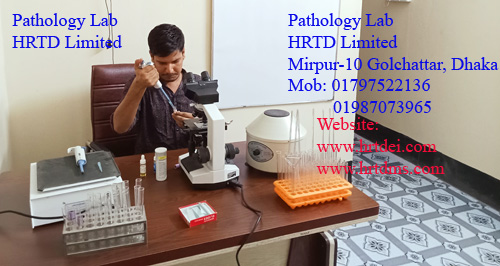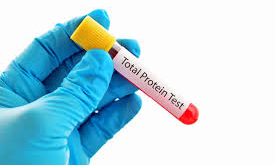Thyroid Function Test Training (Mobile 01797522136) is part of practical of Clinical Biochemistry . Clinical Biochemistry is a subject of Pathology , Paramedical, DMS, LMF and many other courses of HRTD Medical Institute.

Introduction
The human body is an intricate system, and the endocrine system plays a vital role in regulating many essential functions such as metabolism, energy balance, growth, and development. At the center of the endocrine system lies the thyroid gland, a butterfly-shaped gland located in the neck. Its function is crucial, as it produces hormones that influence nearly every cell, tissue, and organ of the body.
To evaluate the function of the thyroid gland, physicians rely on Thyroid Function Tests (TFTs). These laboratory investigations measure the levels of various hormones such as TSH (Thyroid Stimulating Hormone), T3 (Triiodothyronine), T4 (Thyroxine), and in some cases thyroid antibodies. Correct interpretation of these tests allows healthcare professionals to diagnose conditions like hypothyroidism, hyperthyroidism, goiter, thyroiditis, and thyroid cancer.
For medical and paramedical students, laboratory technologists, and healthcare professionals, learning the principles, techniques, and interpretation of thyroid function tests is essential. This is why training institutes such as the HRTD Medical Institute in Dhaka, Bangladesh, play a significant role in shaping competent laboratory professionals.
This comprehensive training content will provide students with:
- A detailed understanding of thyroid physiology.
- An overview of thyroid function tests and their clinical importance.
- Step-by-step laboratory techniques.
- Training opportunities available at HRTD Medical Institute.
- Practical applications, case studies, and future career opportunities.

Chapter 1: Understanding the Thyroid Gland
1.1 Anatomy of the Thyroid Gland
- Location: Situated in the anterior part of the neck, below the Adam’s apple.
- Structure: Consists of two lobes connected by an isthmus.
- Weight: Approximately 20–25 grams in adults.
- Function: Secretes hormones that regulate metabolic activity.
1.2 Physiology of Thyroid Hormones
- T3 (Triiodothyronine): The active form of thyroid hormone that regulates metabolism.
- T4 (Thyroxine): Secreted in larger quantities but converted to T3 in peripheral tissues.
- TSH (Thyroid Stimulating Hormone): Secreted by the pituitary gland, controls thyroid hormone release.
1.3 Importance of Thyroid Hormones
- Regulation of metabolism.
- Growth and development (especially brain development in infants).
- Maintenance of body temperature.
- Influence on heart rate, weight, and energy levels.
Chapter 2: Introduction to Thyroid Function Tests
2.1 What Are Thyroid Function Tests?
Thyroid function tests are blood tests that measure hormone levels to assess how well the thyroid gland is working.
2.2 Common Tests Performed
- TSH Test: The most sensitive marker for thyroid function.
- Free T4 (FT4): Measures the active thyroxine hormone.
- Free T3 (FT3): Measures the active triiodothyronine hormone.
- Thyroid Antibodies: Useful for autoimmune disorders like Hashimoto’s thyroiditis and Graves’ disease.
- Thyroglobulin: Used in monitoring thyroid cancer treatment.
2.3 Indications for Thyroid Testing
- Symptoms of hypothyroidism (fatigue, weight gain, dry skin).
- Symptoms of hyperthyroidism (weight loss, anxiety, tremors).
- Routine screening in pregnancy.
- Follow-up of thyroid patients on treatment.
- Screening newborns for congenital hypothyroidism.
Chapter 3: Laboratory Methods for Thyroid Testing
3.1 Blood Sample Collection
- Venipuncture using sterile techniques.
- Serum separation after clotting.
- Proper labeling and storage at recommended temperature.
3.2 Methods of Hormone Estimation
- Radioimmunoassay (RIA): Traditional method using radioactive isotopes.
- Enzyme-Linked Immunosorbent Assay (ELISA): Widely used due to safety and accuracy.
- Chemiluminescent Immunoassay (CLIA): Highly sensitive and modern technique.
- Electrochemiluminescence (ECL): Gold standard in many laboratories.
3.3 Quality Control in Thyroid Testing
- Internal and external quality control samples.
- Calibration of machines.
- Avoiding sample contamination and hemolysis.

Chapter 4: Interpretation of Thyroid Function Test Results
4.1 Hypothyroidism
- High TSH, low T4.
- Symptoms: fatigue, constipation, hair loss, depression.
4.2 Hyperthyroidism
- Low TSH, high T3/T4.
- Symptoms: weight loss, nervousness, sweating, fast heart rate.
4.3 Subclinical Conditions
- Mild abnormalities in TSH while T3/T4 remain normal.
4.4 Autoimmune Thyroid Diseases
- Positive TPO antibodies in Hashimoto’s thyroiditis.
- Positive TSH receptor antibodies in Graves’ disease.
Chapter 5: Importance of Thyroid Function Test Training for Students
5.1 Why Students Should Learn TFTs
- Understanding endocrine disorders.
- Developing laboratory skills.
- Enhancing diagnostic accuracy.
- Building a foundation for careers in pathology and laboratory medicine.
5.2 Career Opportunities for Trained Students
- Laboratory technologist in diagnostic centers.
- Clinical researcher in endocrinology.
- Employment in hospitals, clinics, and medical institutes.
- Teaching and academic careers.
Chapter 6: HRTD Medical Institute – A Center for Excellence
6.1 About HRTD Medical Institute
Located in Mirpur-10, Dhaka, HRTD Medical Institute is a trusted name in medical and pathological training. With modern laboratory facilities, experienced faculty, and structured training modules, the institute is dedicated to producing skilled laboratory professionals.
6.2 Thyroid Function Test Training Program
- Duration: Short-term and long-term courses available.
- Modules Covered:
- Anatomy & physiology of thyroid.
- Laboratory techniques for TSH, T3, T4 measurement.
- Case studies and interpretation.
- Quality control and reporting.
- Practical Sessions: Hands-on training with ELISA, CLIA, and modern analyzers.
6.3 Student Support & Facilities
- State-of-the-art laboratory setup.
- Experienced trainers and doctors.
- Internship opportunities.
- Certificate upon successful completion.
Chapter 7: Case Studies for Students
Case 1: Hypothyroidism in a Middle-aged Woman
A 45-year-old woman presents with fatigue, weight gain, and hair loss. TFT shows high TSH and low T4. Diagnosis: Primary Hypothyroidism.
Case 2: Hyperthyroidism in a Young Male
A 28-year-old male complains of tremors, sweating, and weight loss. TFT shows suppressed TSH and elevated T3/T4. Diagnosis: Graves’ Disease.
Case 3: Subclinical Hypothyroidism in Pregnancy
A pregnant woman shows slightly elevated TSH with normal T4. Importance: Early treatment prevents developmental issues in the fetus.
Chapter 8: Future of Thyroid Function Testing
- Automation and AI in laboratory diagnosis.
- Personalized medicine based on genetic screening.
- Use of biosensors for rapid testing.
- Telemedicine and remote reporting.
Chapter 9: Why Choose HRTD Medical Institute?
- Reputation: A leading institute in Dhaka for medical and laboratory training.
- Comprehensive Curriculum: Covers both theory and practical.
- Affordable Fees: Making medical education accessible.
- Career Guidance: Helping students secure jobs after training.
- Networking: Connecting students with healthcare professionals.
Chapter 10: Conclusion of Thyroid Function Test Training
Thyroid disorders are among the most common endocrine problems worldwide, and accurate diagnosis depends heavily on thyroid function tests. For students, mastering these tests not only strengthens their academic knowledge but also opens vast career opportunities in laboratory medicine, endocrinology, and healthcare research.
The HRTD Medical Institute, with its advanced facilities and expert trainers, provides the ideal platform for students to excel in this field. By enrolling in the Thyroid Function Test Training Program, students gain hands-on experience, theoretical knowledge, and professional competence that will serve them throughout their careers.
Frequently Asked Questions (FAQ)
Q1: Who can enroll in the Thyroid Function Test Training at HRTD Medical Institute?
Students of medical technology, pathology, laboratory science, and healthcare professionals can join.
Q2: What is the duration of the Thyroid Function Test Training program?
The institute offers both short courses (1–2 months) and extended courses (3–6 months).
Q3: Is the training fully practical or theoretical?
It is a combination of both, with emphasis on hands-on laboratory training.
Q4: Do students receive certificates after Thyroid Function Test Training?
Yes, successful participants receive a recognized certificate from HRTD Medical Institute.
Q5: Can international students apply?
Yes, the institute welcomes students from different regions.
Q6: What equipment is used in Thyroid Function Test Training?
Students are trained using ELISA, CLIA analyzers, and modern laboratory tools.
Q7: What career support does HRTD Medical Institute provide?
The institute guides students towards employment opportunities in diagnostic centers, hospitals, and research facilities.
 Pathology Training Institute in Bangladesh Best Pathology Training Institute in Bangladesh
Pathology Training Institute in Bangladesh Best Pathology Training Institute in Bangladesh


